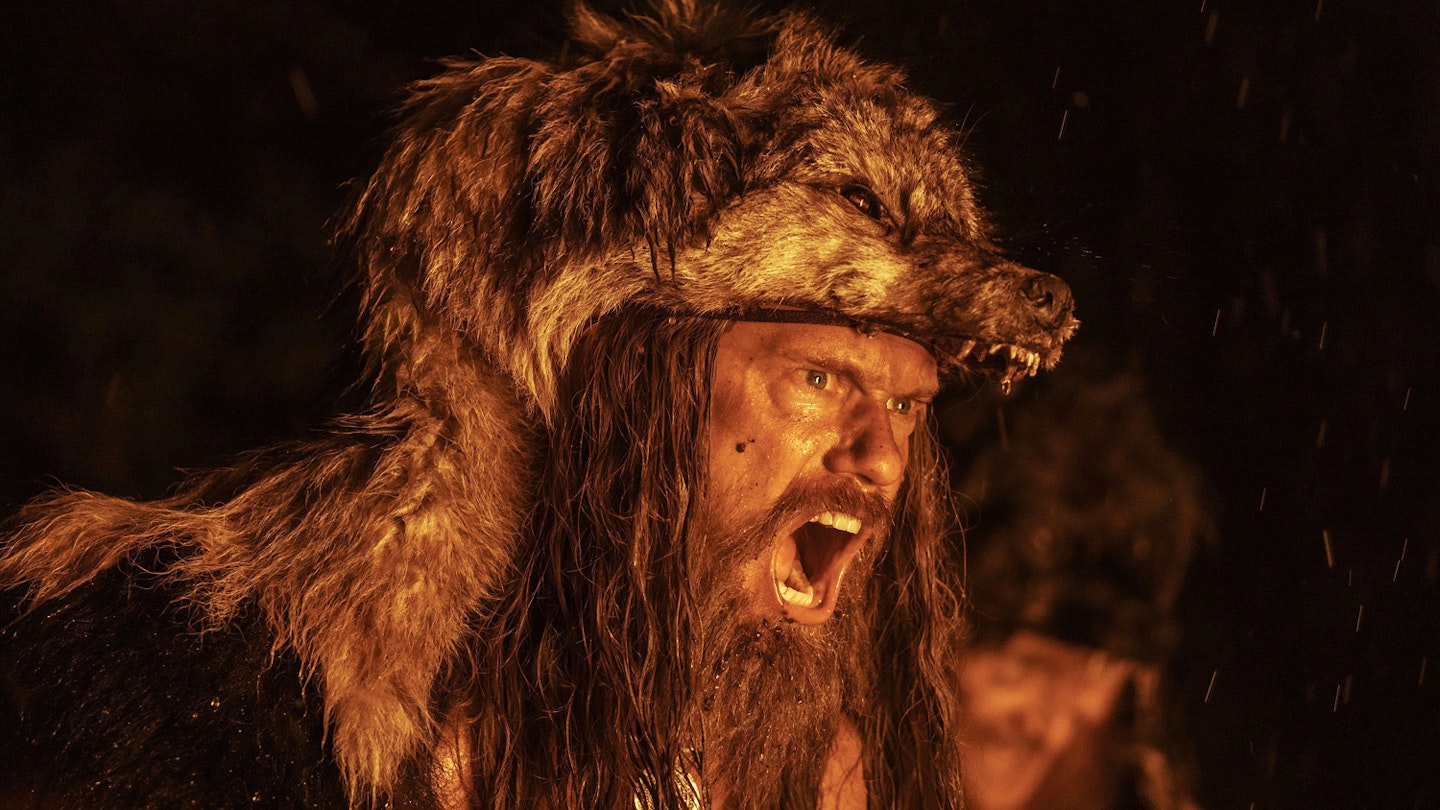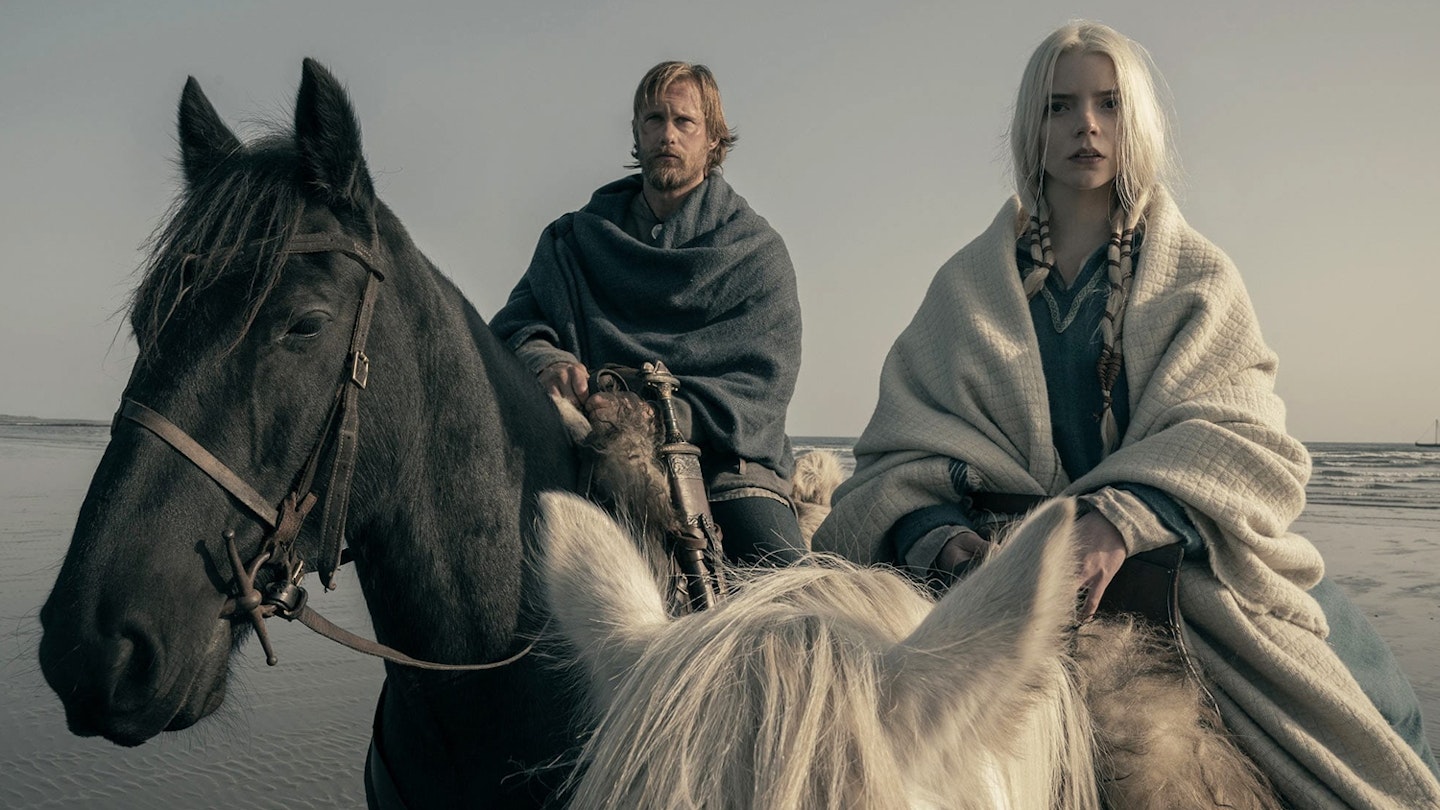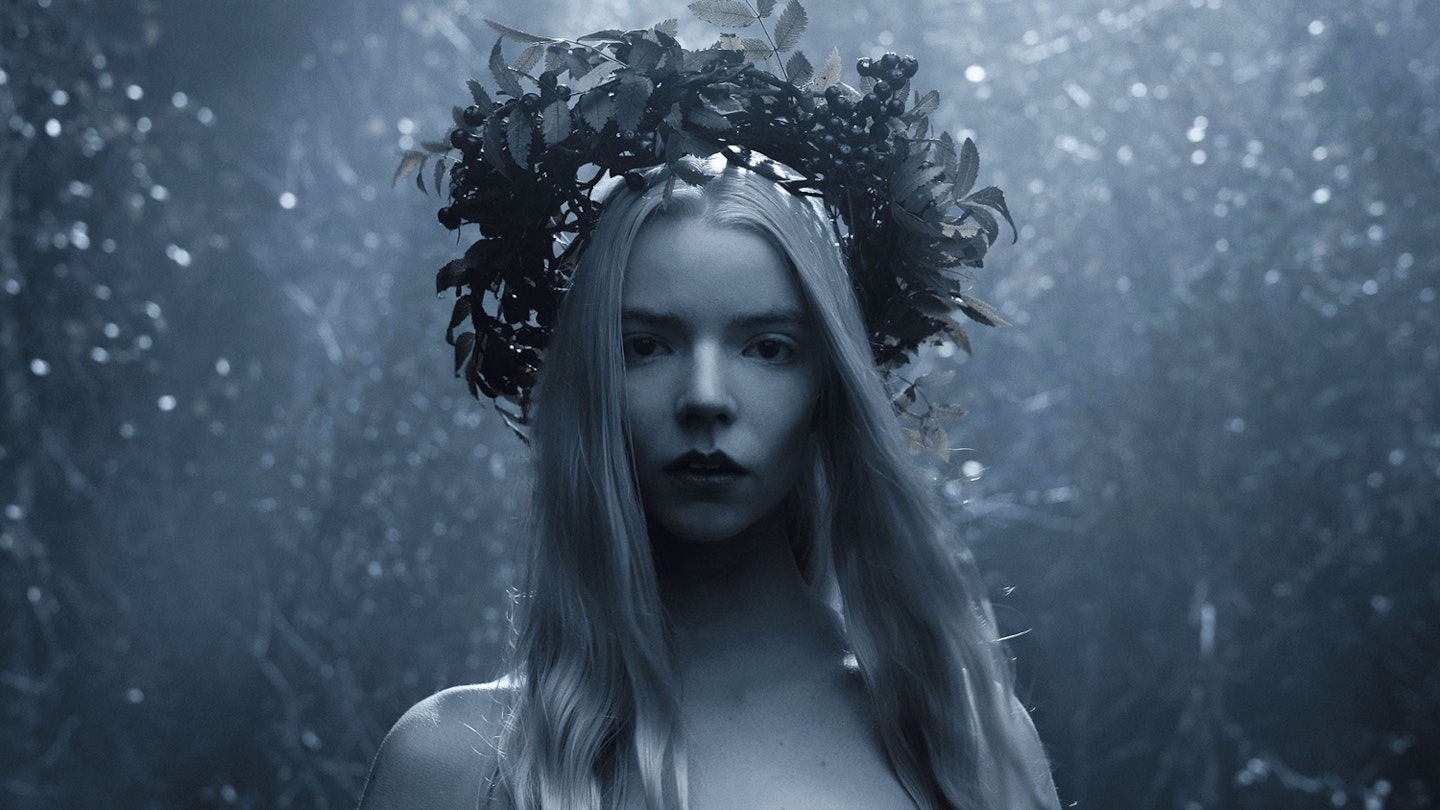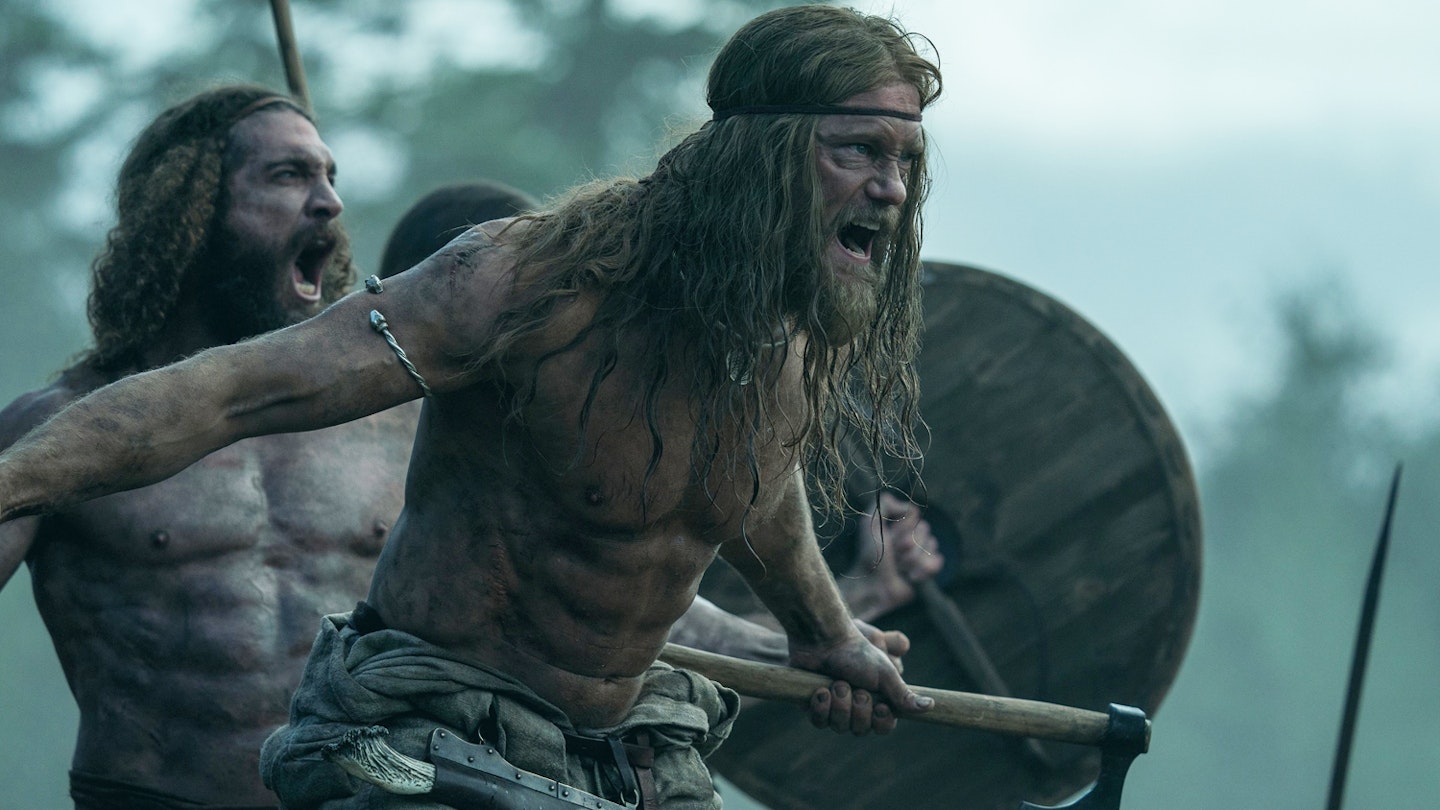Movies like The Northman don’t come around very often – an ambitious all-out Viking epic, with blood and guts and farts and Björk in a wheaty headdress. At the centre of it all is Alexander Skarsgård as Amleth, a vengeance-seeking berserker warrior who witnessed his father’s death at the hand of his nefarious uncle as a child, and has sworn revenge. Not only is Skarsgård on stoic, muscular form as the central character, but the film spun out of his long-brewing desire to bring a real Viking saga to the screen – finding a perfect partner to do just that in director Robert Eggers.
Skarsgård touched down in London recently, so Empire jumped at the chance to bring him onto the Empire Podcast, talking the film’s pandemic shoot, its approach to mythology, and his journey to embody a Viking warrior. Listen to the full interview on the podcast here, or read an edited version below.

EMPIRE: You’re in London. Do you have time to pop over to Belfast, and just wallow in the memories of the past when you were shooting this movie?
Alexander Skarsgård: Unfortunately not since we've shot it, but I would love to go back. When we shot it, it was during the pandemic – summer, fall, early winter of 2020 during the lockdown. Shooting a movie with a crew of 400 during the pandemic, before the vaccine was out, was not easy. We had to be very isolated. So over the course of those six months, I didn't fully experience Belfast. I'm dying to go back and actually be reunited with the local crew there, and go out to the pubs.
I imagine that would have actually helped, that sense of isolation. Because Amleth is someone who sets himself apart from pretty much everybody. That must have fed into your characterisation.
Yeah, it absolutely did. And it was quite an intense shoot, physically and mentally. We didn't have any days off, but on weekends I didn't have much energy to do much anyway. So I was quite isolated. And even if I hadn't been, I probably wouldn't have had much energy to do a pub crawl with the locals. But now that we're done and I'm off the training, I'm off the diet, I'm ready to to return.
Are you really ever off the training, and off the diet, as an actor? You must always constantly be watching what you eat.
No, never. I've only done it twice. It was Tarzan a few years ago, and then The Northman. Those are the only two times I've ever worked with a trainer and been on a strict diet.
Yeah, and that's not fun, from what I understand.
When you're an actor, you're spoiled. You have a lot of help. The studio will get you the best trainer and the best nutritionist and the best plan. They organize everything. So you don't really have to do much. They tell you what to do and when to do it. Of course, you've got to put in some work yourself. But for The Northman, I was very excited about finally making the movie after years of pre-production, and planning, and talking to Rob about the character and the story. There's so many months and years of just hypothetically talking about the character in loose terms. But then when you start training, that's the first day when you go into real pre-production, at least for me as an actor. And it becomes very real that you're actually getting ready to do it.
I was incredibly excited and motivated to actually start that journey, putting on some weight. It felt important. My character's name, when he's a berserker at the beginning of movie, is ‘Bjorn Ulfur’, which means Bear Wolf. There's a scene at the beginning of the movie in which he transforms – he sheds his human shape and becomes this spirit animal, a hybrid of a wolf and a bear. I'm a bit too lean for that character, so it was important to have a bit more bulk and be slightly more bearlike in my posture and size.

It really works. Was that filmed right at the beginning? Did you film it chronologically, or were you always having to go back and forth in terms of your posture and body language?
We went back and forth. We did most of the physical stuff roughly around the midpoint, I'd say. End of month two, month three, month four, those were the months where we shot the big action, the big set pieces – the raid on the village, the end fights, Knattleikr game. All those were roughly in the middle. We started out with scenes on Fjolnir's farm. I don't think it was planned this way, but it ended up being quite good because Rob Eggers, the filmmaker, and I had spent years planning this and talking about it, but we've never been on a movie set together. Anya has worked with him on The Witch, but Rob and I have never worked together. So day one was the first time we're actually on set together.
How Rob and Jarin, his cinematographer, work is quite a particular and unique way of making movies. First of all, it's shot on film. Most of the scenes, there's no coverage at all, it's just one continuous shot. So that is a style of filmmaking I'm not used to. The first two weeks were smaller, more pedestrian scenes, walking around the farm doing labour on the farm, technical stuff – shorter scenes of my character just walking from the barn to the longhouse. It was really good because it was an opportunity for me to learn how they work, and learn the relationship, the dance, between myself and the camera, how meticulously planned it is, how much we had to block it and rehearse it and plan it. And what I needed to bring, because it can easily feel a bit robotic – how to approach it in order to try to instill some life in that, because it is so precise, you don't really have much time or space to move around or improvise or play around. So it was good to have those weeks before we got into the more technically difficult scenes, because by then we had gotten to know each other better on set and how to work in order to to accomplish that.
It would have been terrible if you'd gone through all this work with Rob for five years and got to set and hated working with each other. That would have sucked!
That would have really, really sucked! Incredibly anticlimactic.
The Vikings didn't choose to believe in something. The concept of being agnostic or an atheist didn't exist.
When you and Rob first met, you were talking about something else. But then you moved on to this shared love of Viking sagas, and that's where The Northman came from. You met with him after The Witch, and not after The Lighthouse – you saw The Witch, and thought, 'Oh, my god, here is this incredible new cinematic voice.' Was that what was on your mind?
I was really impressed by The Witch, and I know the producer of The Witch and also know that it was a very small budget, a very small movie. What Rob was able to create was so impressive. It was evident that his attention to detail was just next-level. It really felt like you're transported back in time, and nothing has a sense of a movie set. It feels real, because it is real. Like, he builds those sets in the way they would have been built at the time. Nothing feels even remotely anachronistic.
We met about another project, but then… The Northman is about fate, and it was fated that we should work together. I was with Lars Knudsen, the Danish producer who had just worked with Rob on The Witch, and Lars and I were trying to figure out the perfect Viking story to tell. We're going through the old sagas and trying to decide which one to base our Viking movie on. And then I met Rob about something else, and he had just returned from Iceland where he had had dinner with Björk, and Sjøn, the Icelandic poet, author, musician, Renaissance man. Rob had fallen in love with Iceland, the people, the culture, and was really into Norse mythology after that. I mentioned that I was trying to make a Viking movie, and Rob got fired up and started talking about different ideas. We ended up spending that entire lunch just talking about Vikings. Leaving the meeting, it just felt inevitable. I called Lars and told him about the meeting, and Lars was like, "Rob is a genius. He's amazing to work with. Of course, we should ask if he wants to join us and try to do this together." And so we did.
This takes the bones of Hamlet and does something very, very different with them. There's a spiritual, supernatural side to the movie, which is in a lot of Shakespeare also, of course. Was that baked into the premise from the off, because it's in those those old Icelandic and Norse sagas?
Absolutely. There's a lot of mythology in the old sagas, and you also blur the line between the natural world and the supernatural. There's no clear distinction. The Vikings didn't choose to believe in something. The concept of being agnostic or an atheist didn't exist. And I find that quite fascinating. They believe that [the farmer] on the neighbouring farm transformed into a wolf on the full moon and ran out into the woods all night and killed some sheep, and then the next morning he was a farmer again. And no one questioned that. That's the way it was. That was as real as anything else that you could see in front of you. Same thing with the relationship to the Gods or the spirits.
We wanted to try to capture that in the film, in a way where there are components that to an audience today feel very supernatural, but to Amleth and the other characters at the time, to them it's absolutely real and they don't raise an eyebrow. Nothing's strange about it. There's being picked up by a Valkyrie, or having to fight a seven foot giant – of course, you've heard those stories since you were a little baby. That was very interesting to to explore, and go deeper into the mythology of it.

You are a producer on this as well. This is a much bigger scale than The Lighthouse and The Witch, and it's absolutely 100% Robert’s singular vision. How do you, as producer, get studios and the money-men to play ball with that? Films can be focus-grouped beyond all recognition, and this clearly hasn't been.
I can't take credit for having those conversations with the studio while we were shooting.
Because you were Amleth at that point and you were-
I was crawling around in the mud. The fact that Regency and Focus gave Robert this opportunity is very important and means a lot, because we're living in an age where it's very- It becomes quite polarised, either very small arthouse auteur movies by auteur filmmakers, or massive franchise blockbuster movies. But to have a big budget movie, that doesn't have a built-in IP, or is not part of a franchise, or based on a comic book hero – it's quite unusual for us to do something on this scale, on film, by a filmmaker like Robert Eggers. It takes some guts. I really want to give credit to Focus and Regency for trusting Rob, and giving him this platform and allowing him to create his vision. I think they felt the same I did, watching what Rob can do with very little money. And to think, 'Well, what could he do on a bigger budget, if he had a massive canvas, and he could just create a world and really go crazy and go all the way, and not be restrained by a limited budget?' If you're going to do that and invest in it, you really have to let Robert and Jarin, his cinematographer, go crazy and really stay true to their vision.
The Northman is out now in UK cinemas. Listen to the Empire Podcast here, with new episodes arriving every Friday.
